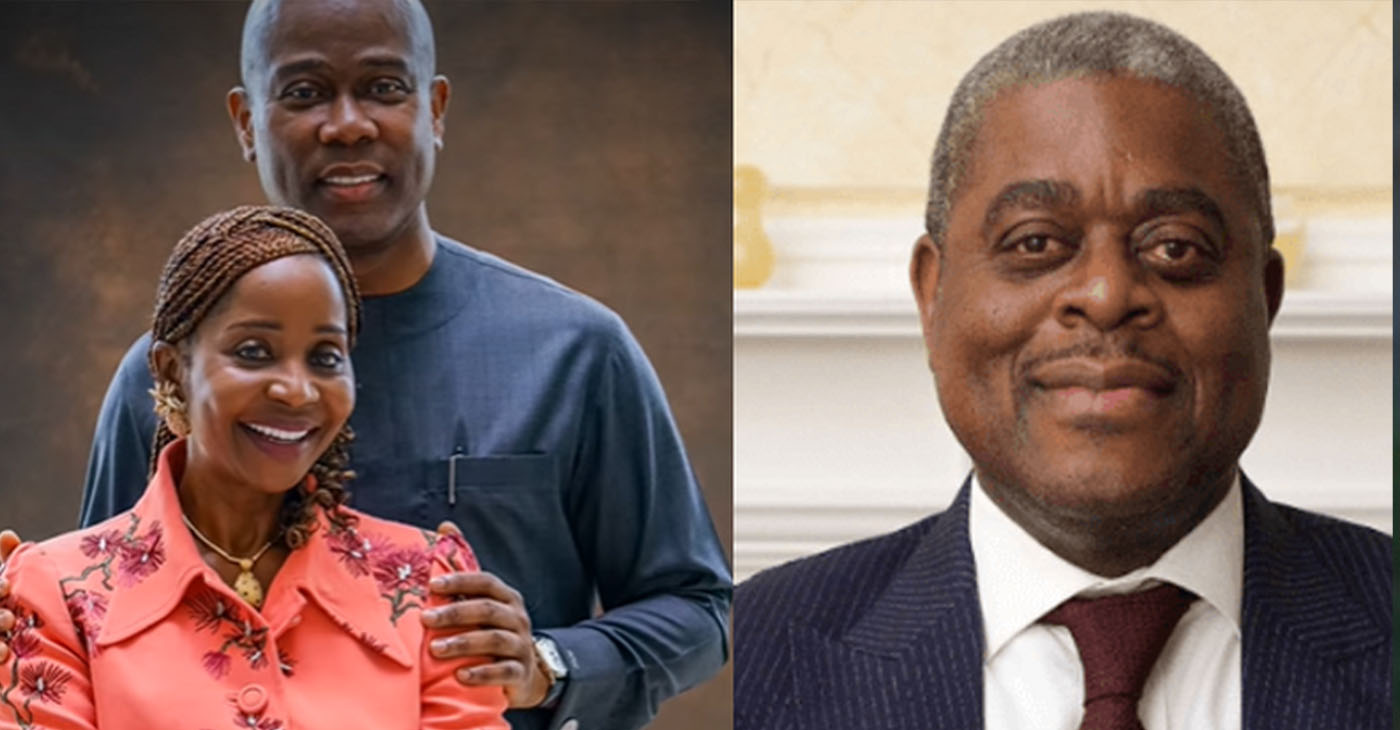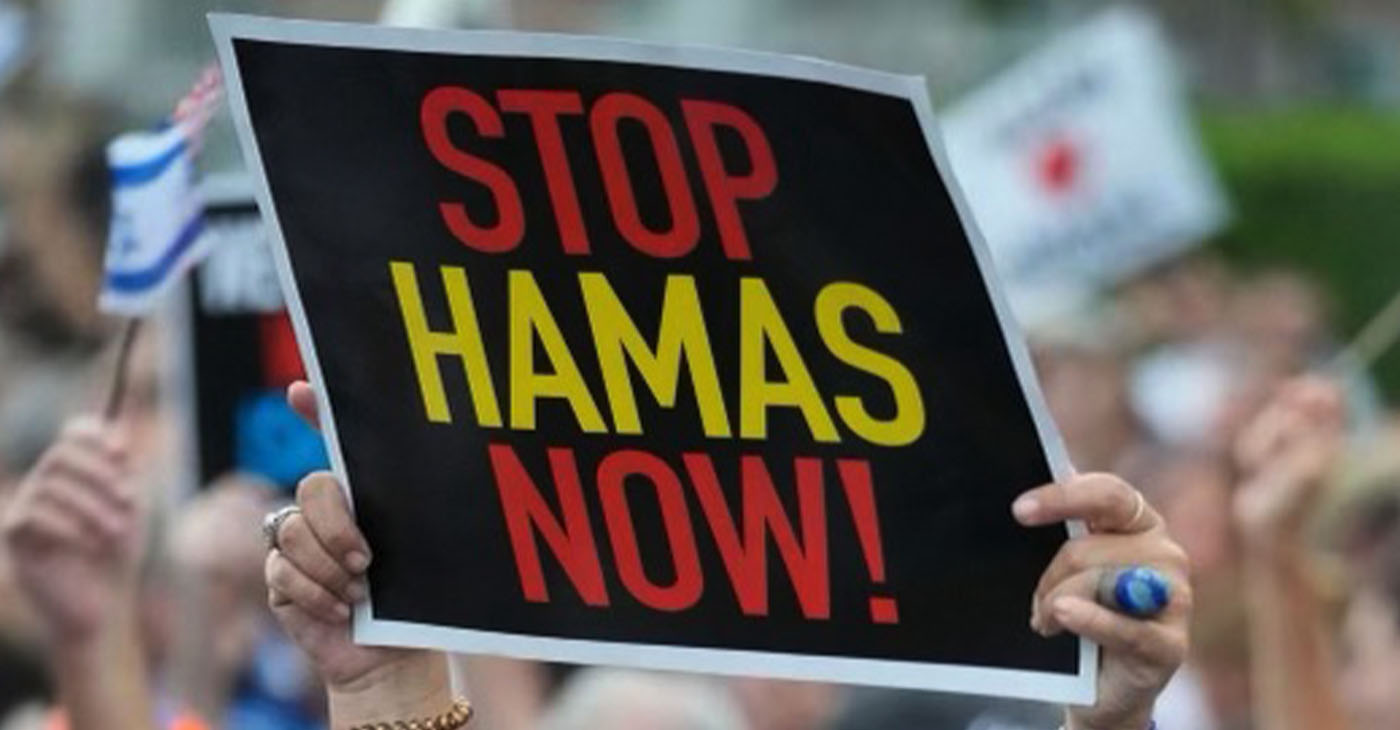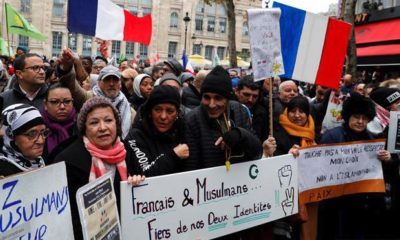World
Cuba-U.S. Warming Held up by Listing of Cuba as Terror Sponsor

In this March 22, 2013 file photo, miniature flags representing Cuba and the U.S. are displayed on the dash of an American classic car in Havana, Cuba. (AP Photo/Franklin Reyes, File)
Michael Weissenstein and Bradley Klapper, ASSOCIATED PRESS
HAVANA (AP) — American hopes of opening an embassy in Havana before presidents Barack Obama and Raul Castro meet at a regional summit this week have been snarled in disputes about Cuba’s presence on the U.S. list of state sponsors of terror and U.S. diplomats’ freedom to travel and talk to ordinary Cubans without restriction, officials say.
The Summit of the Americas will be the scene of the presidents’ first face-to-face meeting since they announced Dec. 17 that they will re-establish diplomatic relations after a half-century of hostility. The Obama administration wanted the embassies reopened before the summit starts in Panama on Friday, boosting a new American policy motivated partly by a sense that isolating Cuba was causing friction with other countries in the region.
Arriving at the summit with a deal to reopen embassies in Washington and Havana would create goodwill for the U.S., particularly after it issued new sanctions on selected Venezuelan officials last month that prompted protests from left-leaning countries around the hemisphere.
Negotiators on both sides said they are confident they will be able to strike a deal to reopen embassies in the coming weeks but not necessarily before the summit.
“It’s not a lot of time, let’s put it that way,” U.S. State Department spokeswoman Marie Harf told a briefing on Friday when asked whether an agreement on embassies was likely before the gathering in Panama City.
Asked Monday about the latest on the embassies, White House spokesman Josh Earnest told reporters that “when you have a country that has essentially been ostracized by the United States for five decades … it’s going to take a little bit of time to re-establish some trust.”
“When you consider the 50-year history between our two countries, three months doesn’t seem very long,” Earnest said, referring to the December announcement.
The U.S. and Cuba have held three rounds of talks about restoring diplomatic relations. Cuba’s main demand is to be removed from the terror list, a Cold War-era designation that isolates it from much of the world financial system because banks fear repercussions from doing business with designated countries. Even Cuba’s Interests Section in Washington has lost its bank in the U.S., forcing it to deal in cash.
Washington has long since stopped accusing Havana of supporting terrorism and Obama made clear in December that he intends to remove Cuba from the list. But U.S. officials said the president must first send Congress a report that says Cuba has not provided any support for international terrorism during the previous six months and has assured the United States that it will not support terrorism in the future.
The terror list is a particularly charged issue for Cuba because of the U.S. history of supporting exile groups responsible for attacks on the island, including the 1976 bombing of a Cuban passenger flight from Barbados that killed 73 people aboard. The attack was linked to Cuban exiles with ties to U.S.-backed anti-Castro groups and both men accused of masterminding the crime took shelter in Florida, where one, Luis Posada Carriles, lives to this day.
Officials familiar with the negotiations told The Associated Press that the demand for assurances there will be no future terror support has led Cuba to reiterate its own past allegations about U.S. involvement in terrorism against the island, and issue a reciprocal demand that the United States pledge to not support such attacks in the future.
The officials spoke on condition of anonymity because they were not authorized to publicly discuss the negotiations.
Despite the delay in reopening the embassies, both sides appear optimistic they can reach agreement on the terror issue in the near future. The United States and Cuba still have to resolve a demand by Washington that its diplomats be allowed to operate like those from any other country once the U.S. Interests Section in Havana becomes a full embassy. American diplomats currently must obtain permission from the Cuban government to travel outside Havana and Cubans must register with Cuban guards before entering the building, a measure the United States says is aimed at dissuading dissidents from contacts with U.S. officials.
The officials said it appeared unlikely that Washington would strike Cuba from the terror list without assurances from Castro’s government that it will allow the future U.S. embassy to operate with fewer restrictions, a sensitive issue for Cuba because it would allow more American contact with dissidents whom the communist government sees as U.S.-backed mercenaries. Other issues include caps on the number of diplomats at the embassy and restrictions on U.S. imports of products ranging from office supplies to household goods.
Cuban insistence on the continued restrictions on freedom of movement by U.S. diplomats could force the Obama administration into tough decisions about what limits it is willing to accept in order to have an embassy in Cuba.
Domestic politics are also fueling U.S. caution in the talks. While Congress cannot permanently block Cuba’s removal from the list, the Obama administration will have to defend its decision in public hearings heading into a presidential campaign season. Republican candidate Ted Cruz and likely candidate Marco Rubio have family ties to Cuba and object to normalization with the Castro government.
Assistant Secretary of State Roberta Jacobson, Obama’s head of Western Hemisphere affairs, said at a forum last week on U.S. business opportunities in Cuba that the terror review “is in very advanced stages and we will try to get that done as quickly as possible.”
“One of the reasons that things are taking a while is that we need certain things to run an embassy,” she added. “That is one of the most important things in our conversations.”
Asked about the status of the negotiations, the U.S. State Department said Friday that the review of Cuba’s inclusion on the State Sponsor of Terrorism list was still under way. A Cuban government spokesman speaking on condition of anonymity because he was not authorized to be quoted by name said that the country had not been asked to make any public declaration about future support for terrorism. He declined to comment further on the discussions.
U.S.-Cuba experts hope progress comes quickly.
“I think it would be smart on both sides to show continued momentum, to demonstrate that the instructions given by the president on Dec. 17 will be faithfully and promptly carried out by their negotiators,” said Richard Feinberg, a senior director of the National Security Council’s Office of Inter-American Affairs under President Bill Clinton.
___
Associated Press writer Michael Weissenstein reported this story in Havana and Bradley Klapper reported from Washington.
Michael Weissenstein on Twitter: http://twitter.com/mweissenstein.
Copyright 2015 The Associated Press. All rights reserved. This material may not be published, broadcast, rewritten or redistributed.
###
Barbara Lee
Congresswoman Barbara Lee Issues Statement on Deaths of Humanitarian Aid Volunteers in Gaza
On April 2, a day after an Israeli airstrike erroneously killed seven employees of World Central Kitchen (WCK), a humanitarian organization delivering aid in the Gaza Strip, a statement was release by Rep. Barbara Lee (D-CA-12). “This is a devastating and avoidable tragedy. My prayers go to the families and loved ones of the selfless members of the World Central Kitchen team whose lives were lost,” said Lee.

By California Black Media
On April 2, a day after an Israeli airstrike erroneously killed seven employees of World Central Kitchen (WCK), a humanitarian organization delivering aid in the Gaza Strip, a statement was release by Rep. Barbara Lee (D-CA-12).
“This is a devastating and avoidable tragedy. My prayers go to the families and loved ones of the selfless members of the World Central Kitchen team whose lives were lost,” said Lee.
The same day, it was confirmed by the organization that the humanitarian aid volunteers were killed in a strike carried out by Israel Defense Forces (IDF). Prior to the incident, members of the team had been travelling in two armored vehicles marked with the WCF logo and they had been coordinating their movements with the IDF. The group had successfully delivered 10 tons of humanitarian food in a deconflicted zone when its convoy was struck.
“This is not only an attack against WCK. This is an attack on humanitarian organizations showing up in the direst situations where food is being used as a weapon of war. This is unforgivable,” said Erin Gore, chief executive officer of World Central Kitchen.
The seven victims included a U.S. citizen as well as others from Australia, Poland, the United Kingdom, Canada, and Palestine.
Lee has been a vocal advocate for a ceasefire in Gaza and has supported actions by President Joe Biden to airdrop humanitarian aid in the area.
“Far too many civilians have lost their lives as a result of Benjamin Netanyahu’s reprehensible military offensive. The U.S. must join with our allies and demand an immediate, permanent ceasefire – it’s long overdue,” Lee said.
Bay Area
Nigerian Bank Chief Killed in Helicopter Crash on Way to Superbowl XVIII
According to the San Bernardino County Sheriff’s Dept., the crash occurred near Nipton, on the edge of the Mojave Desert Preserve. The poor weather conditions — rain, wind and snow showers—may have contributed to the accident, although the investigation is not complete. All six aboard were killed. Herbert Wigwe, 57, founded Access Bank in 1989, and it became the country’s largest competitor, Diamond Bank in 2018.

By Post Staff
The co-founder of one of Nigeria’s largest banks died with his wife, son and three others when the helicopter transporting them from Palm Springs, Ca., to Boulder City, Nev. to attend the fifty-eighth SuperBowl at the stadium outside Las Vegas crashed on Feb. 9.
According to the San Bernardino County Sheriff’s Dept., the crash occurred near Nipton, on the edge of the Mojave Desert Preserve. The poor weather conditions — rain, wind and snow showers—may have contributed to the accident, although the investigation is not complete. All six aboard were killed
Herbert Wigwe, 57, founded Access Bank in 1989, and it became the country’s largest competitor, Diamond Bank in 2018.
More recently, Wigwe was planning to open a banking service in Asia this year after making successful expansions to other parts of Africa, including South Africa, Kenya, and Botswana.
Nigerian President Bola Tinubu described Wigwe’s death as an ‘overwhelming tragedy.”
Oakland resident and Nigerian immigrant Kayode Gbadebo agrees with Tinubu. He met Wigwe in Nigeria but crossed paths with him in London in 2006. Wigwe, he said, “took risks.”
He was young and people thought he couldn’t do what he intended, which was not so much about money but community.
“He was more like Jesus in washing the feet of the poor– Wigwe was culturizing community,” Gbadebo said.
“There will never be another like him. This is a deep, deep loss” and he hopes everyone will eventually “be comforted.”
He was also disappointed that a replacement has already been named even before Wigwe is buried. “It is not reasonable. You don’t want a vacuum, but it’s” not fair to the family, Gbadebo observed.
Wigwe had also been working to solve the migration issues from African countries, believing that “investing in higher education was key to controlling mass migration, which “is destabilising countries across the world,” BBC News reported.
“We need to take a holistic approach to address global migration, starting with our traditional framework for international development,” Wigwe wrote.
To that end, according to BBC News, Wigwe was preparing to open Wigwe University in Niger, where he was from.
“The best place to limit migration is not in the middle of the Mediterranean or the English Channel or the Rio Grande. It is in the home countries that so many migrants are so desperate to leave,” he wrote, saying his university was an opportunity for him “to give back to society.”
Besides Wigwe and his wife, Chizoba Nwuba Wigwe, and one son, two crew members and Bimbo Ogunbanjo, former group chairman of the Nigerian Exchange Group Plc, were also killed in the crash.
According to Wikipedia, three other children survive Wigwe.
In his statement reported in People magazine, Tinubu described Wigwe as “a distinguished banker, humanitarian, and entrepreneur.”
“I pray for the peaceful repose of the departed and ask God Almighty to comfort the multitude of Nigerians who are grieving and the families of the deceased at this deeply agonizing moment,” the president said.
He added, “Their passing is an overwhelming tragedy that is shocking beyond comprehension.”
Besides feeling the tremendous loss, Gbadebo fears the disorder and greed that will follow. “It’s a mess,” he said.
People magazine, BBC News and Wikipedia were the sources for this report.
Activism
No Valid Reason for Failing to Condemn Hamas’ Act of Terrorism
On Oct. 7, 2023, Hamas terrorists crossed the Israel-Gaza border and indiscriminately slaughtered Israeli civilians in their homes. They killed nearly 300 young people at a music festival and took at least 200 hostages including 30 children. The atrocities they committed included massacres of families, abduction of the elderly and children, burning of babies and rapes of women.

By Joe W. Bowers Jr.
California Black Media
OPINION
On Oct. 7, 2023, Hamas terrorists crossed the Israel-Gaza border and indiscriminately slaughtered Israeli civilians in their homes.
They killed nearly 300 young people at a music festival and took at least 200 hostages including 30 children. The atrocities they committed included massacres of families, abduction of the elderly and children, burning of babies and rapes of women.
The horrific surprise attack deserves universal and unequivocal condemnation. President Joe Biden called what Hamas did “an act of sheer evil” and pledged to defend the lives of Israelis and Jewish Americans.
He said, “Let there be no doubt. The United States has Israel’s back. We’ll make sure the Jewish and democratic state of Israel can defend itself today, tomorrow, as we always have.”
Hamas killed approximately 1,400 people including 32 Americans. Citizens from 40 different countries including the United Kingdom, France, Mexico, and Thailand were killed or reported missing.
Hamas fighters breached Israel’s border defenses on the final day of Sukkot while soldiers were away due to the holiday and launched attacks on 22 towns outside the Gaza Strip. This security lapse has been described as a catastrophic failure of Israel’s intelligence agencies..
Hamas is an extremist Islamist militant organization that has governed the Gaza Strip since 2007. It is recognized as an Iranian-backed terrorist group by the U.S. and the European Union and has a long history of violence against Jews and Palestinians, the latter of whom they often use as human shields.
While there have been plenty of groups who have unequivocally condemned the massacres, there are a number who haven’t, including organizations such as the Democratic Socialists of America (DSA), Black Alliance for Peace, Red Nation, and independent Black Lives Matter (BLM) chapters (excluding the national Black Lives Matter Global Network Foundation).
The DSA San Francisco chapter put out a statement on Oct. 9 that said, “Socialists support the Palestinian people’s, and all people’s, right to resist and fight for their own liberation. This weekend’s events are no different.”
Student organizations at a number of universities and colleges in California signed a solidarity statement titled “Resistance Uprising in Gaza” from Students for Justice in Palestine (SJP). The statement attributes the violence of the Hamas attack to what it refers to as Israeli apartheid and occupation.
The SJP statement written by Bears for Palestine at UC Berkeley says, “We support the resistance, we support the liberation movement, and we indisputably support the Uprising.” Essentially, these students are indirectly associating themselves with Hamas’ barbaric acts under the guise of “resistance.”
Signing the statement were 51 student organizations including those from Stanford, UC Berkeley, UCLA, UC Davis, UC San Diego, CSU Sacramento, and USC.
A statement signed by 34 Harvard student organizations said, “We, the undersigned student organizations, hold the Israeli regime entirely responsible for all unfolding violence.”
Many university leaders, where these students are enrolled, have been guilty of failing to unequivocally condemn Hamas and for inadequately addressing their students’ expressed support for Hamas.
Several Stanford faculty members, including three Nobel laureates, condemned Stanford’s administrators’ weak response to acts of terrorism and the expression of pro-Hamas sentiments by students on campus.
Israel unilaterally withdrew from Gaza in 2005. It dismantled 21 Israeli settlements in the territory and handed them over to the Palestinian Authority.
The assault by Hamas on Oct. 7 was not an ordinary clash with Israel. Hamas’ actions resulted in the deadliest single day for Jews since the Holocaust.
While there are valid reasons for protesting Israel’s treatment of Palestinians and a real reckoning with the Israeli government on its policies is long overdue, nothing justifies Hamas’ attack.
Israelis who were killed largely had nothing to do with the conditions of Palestinians in Gaza. Some of the victims weren’t even Israeli — they were just tourists.
The students blaming Israel for the atrocities committed by Hamas have faced criticism. Some groups have withdrawn their endorsements because of the backlash aimed at them. Others have doubled down on their activism. SJP held a “National Day of Resistance” on several campuses.
Several CEOs have asked Harvard to disclose a list of members from the organizations assigning responsibility to Israel to insure they do not hire any of their members. A Berkeley law professor has also urged firms not to hire his students who have publicly blamed Israel for the war.
This California Black Media report was supported in whole or in part by funding provided by the State of California, administered by the California State Library.
-

 Activism4 weeks ago
Activism4 weeks agoOakland Post: Week of March 27 – April 2, 2024
-

 #NNPA BlackPress4 weeks ago
#NNPA BlackPress4 weeks agoCOMMENTARY: D.C. Crime Bill Fails to Address Root Causes of Violence and Incarceration
-

 #NNPA BlackPress4 weeks ago
#NNPA BlackPress4 weeks agoFrom Raids to Revelations: The Dark Turn in Sean ‘Diddy’ Combs’ Saga
-

 #NNPA BlackPress4 weeks ago
#NNPA BlackPress4 weeks agoCOMMENTARY: Lady Day and The Lights!
-

 #NNPA BlackPress4 weeks ago
#NNPA BlackPress4 weeks agoMayor, City Council President React to May 31 Closing of Birmingham-Southern College
-

 #NNPA BlackPress4 weeks ago
#NNPA BlackPress4 weeks agoBaltimore Key Bridge Catastrophe: A City’s Heartbreak and a Nation’s Alarm
-

 #NNPA BlackPress4 weeks ago
#NNPA BlackPress4 weeks agoBaltimore’s Key Bridge Struck by Ship, Collapses into Water
-

 #NNPA BlackPress4 weeks ago
#NNPA BlackPress4 weeks agoBeloved Actor and Activist Louis Cameron Gossett Jr. Dies at 87















































